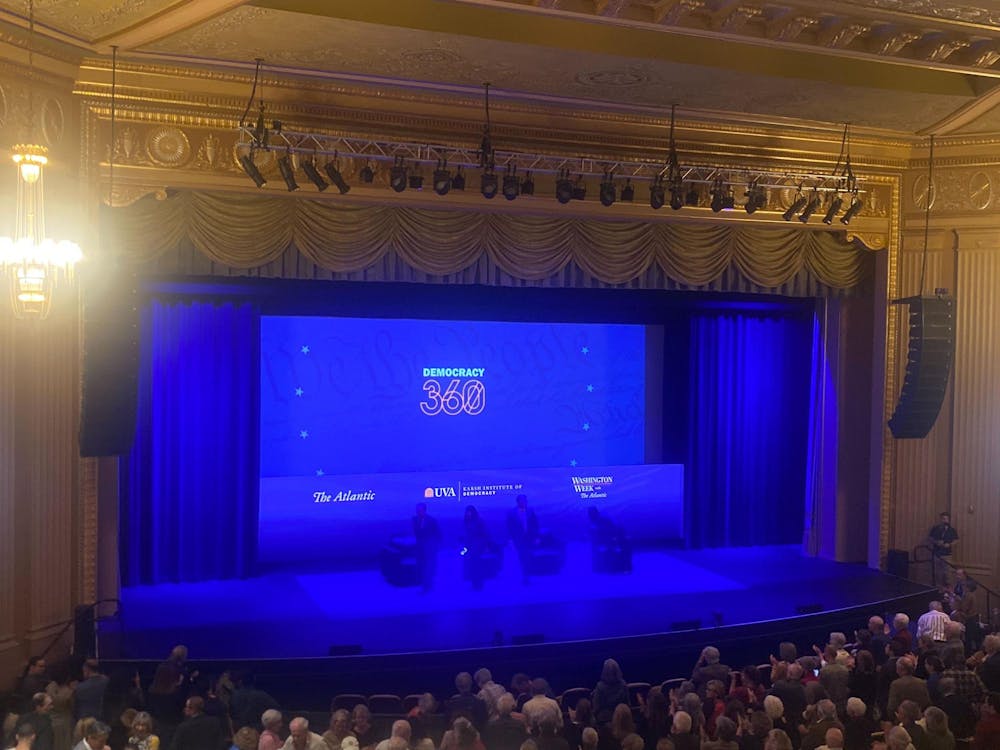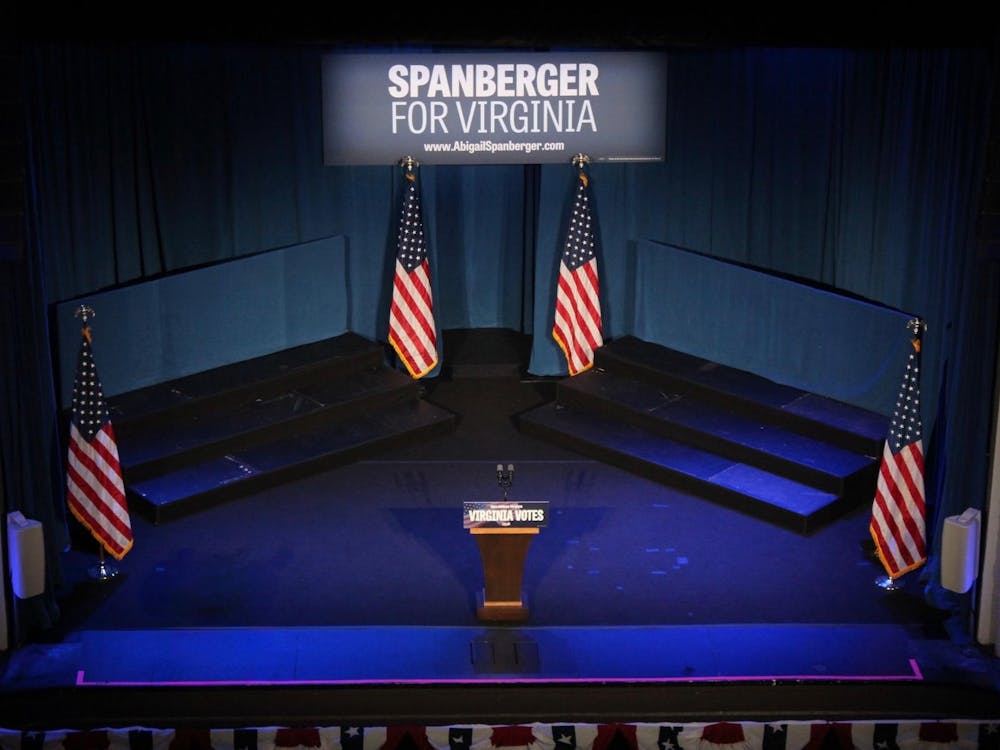The University’s Karsh Institute of Democracy brought several journalists to Charlottesville Thursday night to analyze high profile news stories in a special episode of PBS’s “Washington Week with the Atlantic” program. The roundtable discussion was part of the Karsh Institute’s Democracy 360 event, a three-day series of conversations on the past, present and future value of American democracy from Oct. 15-17.
Atlantic Editor-in-Chief Jeffrey Goldberg moderated a conversation with Atlantic staff writers Tom Nichols, Vivian Salama and Nancy Youssef. The journalists discussed the recent Pentagon restrictions on reporters, national security and President Donald Trump’s Gaza ceasefire deal in front of a live audience at the Paramount Theater.
Goldberg and Youssef began by speaking about the journalists who turned in their badges at the Pentagon after being told to sign a document which the journalists argue violated their First Amendment rights. Wednesday, dozens of reporters from various institutions — Fox News, The New York Times and more— walked out of the building, including Youssef, who has been a Pentagon correspondent since 2007. Youssef noted that, in all her years as a correspondent, there has always been a two-way sense of responsibility between the Pentagon and the people.
“[The Pentagon] asks 2 million Americans to put their lives on the line and on behalf of this country,” Youssef said. “There was a feeling … that they had a responsibility to literally and figuratively open the doors to questions about the decisions around national security.”
In addition to instructing journalists to only cover pre-approved information, the document also stated that journalists could not “solicit” information. Youssef and Goldberg said that utilizing the word “solicitation” is intentionally done to make journalists seem untrustworthy, but that in reality it simply refers to asking questions. The press corps attempted to negotiate on an agreement, Youssef said, but ultimately could not reach one.
Youssef said there was deep sadness Wednesday among the reporters, as they cleaned out desks full of years of work-related memorabilia and said goodbye to the Pentagon’s security and cleaning crews. However, she was also optimistic about the number of people who supported their decision.
“I can't tell you how many people came up to us sort of quietly and said, ‘You're doing the right thing. I'm going to keep talking to you. I'm going to give you information.’ And they weren't doing it as a favor to me,” Youssef said. “They took an oath to defend the Constitution.”
Goldberg then played “devil’s advocate,” as he put it, in a question for Nichols. He asked him to articulate why calling for reporters to stay out of military affairs is precisely so unreasonable. Nichols, who was a Defense Department employee for 25 years prior to his role as a journalist, said that the Trump administration’s current attitude towards reporters does not stem from concerns over classified information, rather a distrust of the American people entirely.
“The difference is, what you're really seeing is somebody saying … ‘There is no good faith here. These are not people who are trying to help us tell a story, inform the American public, support our constitutional system,’” Nichols said.
Goldberg said that he thinks Hegseth’s goals will backfire.
“Pete Hegseth might think that this is going to stop us … [but] I’m going to hire more Pentagon correspondents,” Goldberg said.
Fourth-year College student Ivy Cobbs said she appreciated the opportunity to hear from those with insider knowledge on how these government entities have traditionally conducted themselves in comparison to today.
“There are norms and precedents in place for how people act, and relationships between colleagues and how they treat information and share information,” Cobbs said. “Those people we heard from tonight, could all attest to how those precedents are being broken.”
The discussion also touched on questions of international security, ranging from United States action against Venezuela to whether Trump will intervene if China and Russia move to invade neighboring countries.
According to Youssef, a national defense strategy prioritizing domestic over foreign threats will allegedly be coming out soon. She said that Americans should anticipate a reallocation of military troops and focus towards the Western Hemisphere, rather than towards China and Russia.
Audience member Kelsey Crawford found the focus on international security concerns to be eye opening.
“[These are] things I have not been tapped into, like conflict between China and Taiwan and North and South Korea,” Crawford said. “All these global conflicts that I don't think that [the administration is] prepared to tackle.”
Salama thinks that the Trump administration is decreasing international engagement to specifically create an appearance of dominance in the Western Hemisphere, pointing to recent strikes on boats near Venezuela and the deployment of the National Guard into American cities.
The speakers also brought up Trump’s involvement in the ceasefire deal between Hamas and Israel in regards to the Gaza strip as a point of success for the president. On Sept. 29, Trump announced a 20 point Gaza peace plan alongside Israeli Prime Minister Benjamin Netanyahu. Hamas and Israel signed off on the first part of the plan Oct 9, which included a release of all hostages and prisoners. However, they noted that his unconventional negotiation tactics might be unsustainable.
“He sort of forced it along,” Youssef said. “He created a reality. So the question becomes, can he do that again?”
Throughout the evening, the journalists noted the risk of continuing to normalize what they perceived as increasingly unprecedented actions undertaken by the Trump administration. However, these remarks were said in tandem with a belief in the tenacity of the American people.
“This administration, in some ways, even though they were in power for four years before this, don't understand how this country works,” Nichols said. “That [reporters] have to go home and say ‘Ok, I guess we just won't write about this anymore.’ Have you met other Americans?”







